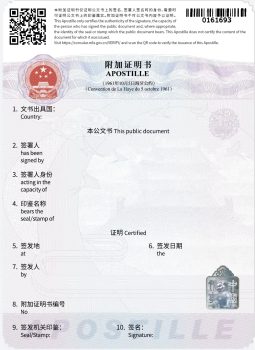In recent years, the global landscape has witnessed China’s continued efforts to enhance its international relations and participate more actively in the international legal framework. One significant development in this regard is China’s accession to the Hague Convention, a multinational treaty that simplifies the process of authenticating public documents for use in foreign countries. This move reflects China’s commitment to fostering greater international cooperation and facilitating cross-border transactions. With this accession, the traditional practice of embassy authentication for legal documents is replaced by the simpler and more efficient method of apostille certification.
Abolishing the Requirement of Legalization
The Hague Convention Abolishing the Requirement of Legalization for Foreign Public Documents, commonly known as the Apostille Convention, is an international treaty that was established in 1961. The primary objective of the convention is to eliminate the need for multiple layers of authentication for public documents issued in one member country when presented in another member country. The apostille certification serves as a standardized authentication method, ensuring the validity and authenticity of documents without the requirement for embassy legalization.
China’s Decision to Join the Hague Convention
China’s decision to accede to the Hague Convention represents a significant shift in its approach to international document authentication. Historically, the authentication process for Chinese documents intended for use abroad involved time-consuming and bureaucratic procedures, often requiring embassy or consulate authentication. This practice not only posed logistical challenges but also increased the overall time and cost associated with international transactions.
By acceding to the Hague Convention, China acknowledges the importance of simplifying and standardizing the document authentication process to align with international norms. The move is seen as a positive step toward promoting transparency, efficiency, and trust in the global arena.
Benefits of Apostille Certification:
Simplified Process:
Apostille certification simplifies the document authentication process, streamlining the steps required for international recognition. This is particularly beneficial for individuals, businesses, and legal entities engaged in cross-border activities.
Time and Cost Savings:
The elimination of embassy authentication reduces the time and costs associated with legalizing documents for international use. Apostille certification provides a more straightforward and cost-effective alternative, enabling faster transactions.
Global Recognition:
Apostille certification enjoys broad international recognition, facilitating smoother interactions between countries. The standardized format ensures that documents are readily accepted in member countries without the need for additional verification.
Enhanced International Cooperation: By adopting the Hague Convention, China aligns itself with global standards for document authentication. This enhances international cooperation, fosters trust, and contributes to the development of a more interconnected and efficient global legal system.
China’s accession to the Hague Convention marks a significant step toward modernizing its approach to document authentication and aligning its practices with international standards. The adoption of apostille certification over embassy authentication reflects a commitment to fostering greater efficiency, transparency, and collaboration in international affairs. This move not only benefits individuals and businesses engaged in cross-border activities but also contributes to the overall improvement of the global legal framework. As China continues to play an increasingly prominent role on the world stage, its commitment to international conventions such as the Hague Convention signals a positive and constructive approach to global engagement.

